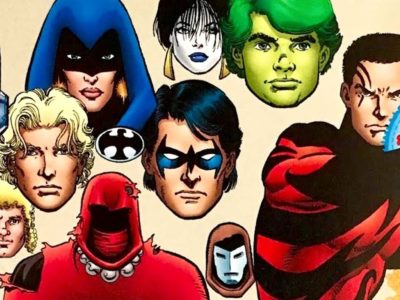
[ad_1]
Recent stories have highlighted the importance — and good — that superhero and supervillain support groups can do.
WARNING: The following contains spoilers for Suicide Squad: King Shark #6, now on sale from DC Comics.
The Marvel and DC Universe have quietly morphed in major ways over the years, embracing ideals of modern society that might have seemed radical just a decade ago. The includes a growing understanding and acceptance of different forms of therapy, including one that has become increasingly popular.
Suicide Squad: King Shark #6 (by Tim Seeley, Scott Kolins, John Kalisz, and Andworld Design) features the newest iteration of a recurring concept: the superpowered support group. It’s a concept utilized in various other stories as well, and one that should become a standard aspect of life in a world of superpowered individuals.
The final pages of Suicide Squad: King Shark #6 focuses on a small group of people in Bludhaven, coming together to catch up at the Haven Community Center. There, Orca and Defacer are able to open up about their fears and their passions. They’re able to be up front about their recent actions, and explore what has motivated them. In part run by Orca, the reformed villain’s work has actually been a positive for herself and others. She’s reached a point where she can dislike someone like Defacer, but use her words to express her emotions instead of lashing out. This is positive growth for the former villain, and indicative of the effect a superpowered support group can have.
This isn’t the first time this happened recently, with the meetings of Batman’s former sidekicks in Robins largely playing out like extended family therapy sessions. Even stories in Marvel have explored that idea, with characters like Jarvis opening up support groups for the loved ones of heroes to share their fears and traumas with one another. Living in a superhero world is an inherently stressful situation. Heroes, villains, and even civilians are beset every day with new kinds of threats. It’s good when therapy gives them the opportunity to open up without having to resort to violence or destruction. Series like Runaways and The Superior Foes of Spider-Man have introduced former hero and villain support groups, with the participants coming together to make peace in their lives.
This is especially notable after the events of Heroes in Crisis, which saw mental health assistance given to the hero community only for it to backfire. A place like Sanctuary was designed as a home for troubled heroes and villains to open up and find peace in what was meant to be a safe environment. But the events of Heroes in Crisis ended with Sanctuary exposed to the world and many of its patients killed in a grisly slaughter. It’s important to note that a big element of Sanctuary was the various robots and replicas in the operation. While it was meant to ensure secrecy and privacy, it also left many of the heroes disconnected emotionally. The heroes having a place where they could be open with one another about their experiences and traumas would be a major source of assistance.
With the heroes actually able to explore their traumas, then perhaps events like Scarlet Witch’s deteriorating mental state in the Marvel Universe during Avengers Disassembled or Green Lantern’s breakdown following the destruction of Coast City could have been met with empathy and understanding. Given the success of even smaller support groups, the Marvel and DC Universe should both embrace the chance to have a stabilizing effect on their characters and showcase how good group therapy can be for everyone.
About The Author
[ad_2]






